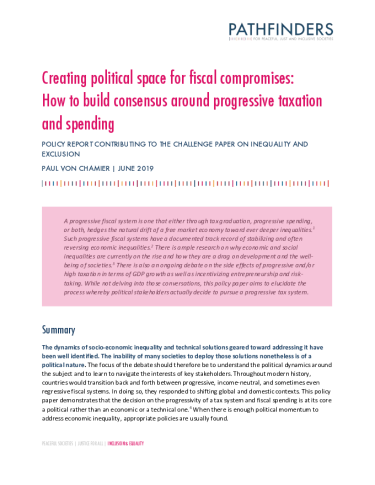Creating Political Space for Fiscal Compromises: How to Build Consensus Around Progressive Taxation and Spending
Contributors: Paul Von Chamier
This policy brief is the third contribution to the challenge paper on the Grand Challenge on Inequality and Exclusion, part of the Pathfinders initiative, which will be launched in July 2019 at the UN High-level Political Forum.

A progressive fiscal system is one that either through tax graduation, progressive spending, or both, hedges the natural drift of a free market economy toward ever deeper inequalities. Such progressive fiscal systems have a documented track record of stabilizing and often reversing economic inequalities. There is ample research on why economic and social inequalities are currently on the rise and how they are a drag on development and the wellbeing of societies. There is also an ongoing debate on the side effects of progressive and/or high taxation in terms of GDP growth as well as incentivizing entrepreneurship and risktaking. While not delving into those conversations, this policy paper aims to elucidate the process whereby political stakeholders actually decide to pursue a progressive tax system.

Summary
The dynamics of socio-economic inequality and technical solutions geared toward addressing it have been well identified. The inability of many societies to deploy those solutions nonetheless is of a political nature. The focus of the debate should therefore be to understand the political dynamics around the subject and to learn to navigate the interests of key stakeholders. Throughout modern history, countries would transition back and forth between progressive, income-neutral, and sometimes even regressive fiscal systems. In doing so, they responded to shifting global and domestic contexts. This policy paper demonstrates that the decision on the progressivity of a tax system and fiscal spending is at its core a political rather than an economic or a technical one. When there is enough political momentum to address economic inequality, appropriate policies are usually found.
Classical arguments of political economy do not properly capture the essence of inequality dynamics. When confronted with evidence, many standard assumptions around what political developments exacerbate or curb inequality do not hold water. Counterintuitively, democracy does not seamlessly translate to less inequality. Moreover, even when a democratic society is free of elite capture and has a left-leaning government at its helm, it might still be not enough to achieve sizeable and lasting changes in socio-economic distribution. Assumptions about the inevitability of inequality under certain circumstances are also often wrong. Globalization, while driving countries to enter the race to the bottom in terms of corporate taxes, does not create pressure to slash personal income taxes.
Forward-looking political arguments for progressive fiscal spending can be based on three different foundations: fairness, fear of instability, and external-internal interactions. Evidence from a diverse pool of developing and developed countries shows that rationale that compels decision makers to actually enact fiscal progressivity can be grouped into three main categories. Demand for economic fairness is a strong driver of human behavior. People will enact to erase what is seen as unearned privilege, especially when a situation arises that serves as a lightning rod for their frustration. Another strong catalyst for fiscal progression is fear of instability. When inequalities threaten a state’s survival, appropriate policies are likely to be enacted. Finally, interactions with external actors such as the World Bank or the International Monetary Fund (IMF) might reinforce local reformist voices, leading to more progressivity.
Many occurrences can prevent progressive taxation and spending, even when the right amount of social support and sound arguments are in place. These arguments need to be further refined by being framed in a way that navigates fraught social interactions around sharing resources, especially in culturally diverse societies. They need to tap into the psychological dynamics underpinning people’s perception of inequalities. If successful, such arguments can serve as a lightning rod for people’s frustrations, successfully attracting a broad coalition of political partners at the intersection of various social challenges.
Read the full paper Creating political space for fiscal compromises: How to build consensus around progressive taxation and spending.pdf